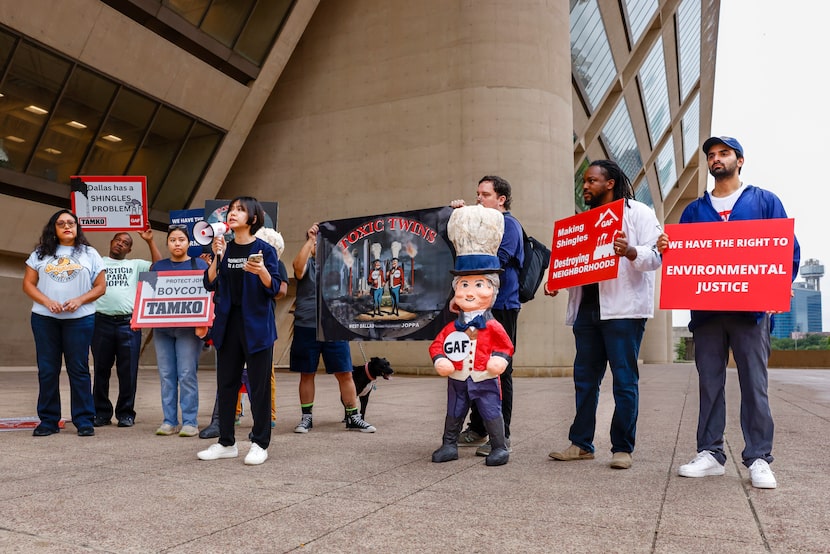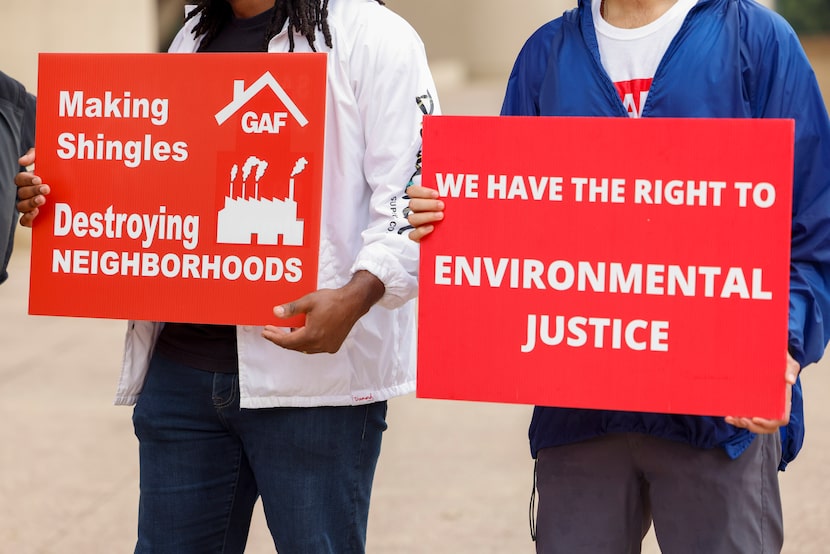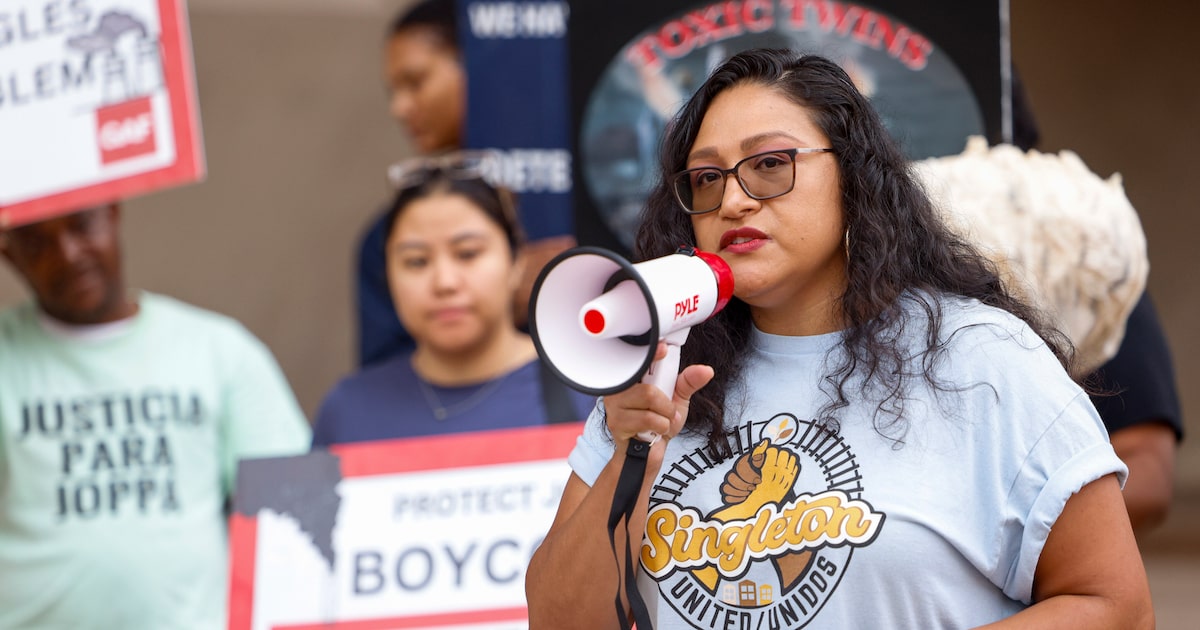Environmental activists launched a campaign this week to push the city of Dallas to shut down two plants they say are polluting Dallas neighborhoods.
Outside of Dallas City Hall on Monday, Janie Cisneros, leader of Singleton United/Unidos in West Dallas, and Emmanuel Davis from Justice for Joppa announced “The Toxic Twins: Fund the Fund Campaign.”
Related:Southern Dallas residents worried for their health as EPA unveils plan for Superfund site
Activists want Dallas to use amortization — a tool that allows cities to close businesses that negatively impact the community — to shutter two shingle factories: GAF in West Dallas and TAMKO in Joppa.
Breaking News
“It is important that we hold the city accountable for its actions, especially when they don’t comply with their own code just to keep their citizens’ health in danger,” Cisneros said. “It is so shameful that they have the power to help so many, but they don’t.”
GAF says its plant complies with federal and state regulations; TAMKO did not respond to an email request for comment.
The issue around amortization became muddy in May 2023 after state legislators passed Senate Bill 929, which protects business owners and allows affected businesses to request compensation for their losses. That means Dallas would have to pay GAF and TAMKO in order to shut them down. Activists estimate the cost at more than $50 million.
Earlier this year, the Dallas City Council amended the Dallas Code of Development to align with SB 929. Based on the city attorney’s recommendation, the council added a provision that removes a resident’s right to petition for an amortization process.
 Cindy Hua, Downwinders at Risk board chair (center left), speaks during a news conference to announce Toxic Twins: Fund the Fund Campaign outside Dallas City Hall, Monday, July 14, 2025, in Dallas. The campaign pushes for the removal of TAMKO and GAF through the city’s nonconforming use fund.(Elías Valverde II / Staff Photographer)
Cindy Hua, Downwinders at Risk board chair (center left), speaks during a news conference to announce Toxic Twins: Fund the Fund Campaign outside Dallas City Hall, Monday, July 14, 2025, in Dallas. The campaign pushes for the removal of TAMKO and GAF through the city’s nonconforming use fund.(Elías Valverde II / Staff Photographer)
The city created a fund to cover business losses and stipulated that there must be enough money available to pay for a nonconforming property before an application for amortization can be approved. Funding hasn’t been allocated. The city would then hold a public hearing to determine if the continued operation of the business will adversely affect nearby properties.
Before the law was in place, Dallas used amortization on rare occasions, including the shuttering of a car wash where attempts to curb drug crimes repeatedly failed in 2016, and in 2019 when a small auto repair operation that had been at its location for years was shuttered when city planners pushed through new zoning.
During Monday’s news conference, two piñatas depicting two well-dressed older white men were brought in to represent the two companies. A banner with the same drawings as the piñatas and the Dallas skyline read “Toxic Twins.”
West Dallas
Cisneros has led a campaign for more than five years to shut down GAF, a roofing materials company headquartered in New Jersey that has operated its West Dallas facility at 2600 Singleton Blvd., for almost 80 years. Activists say the plant releases harmful emissions of sulfur dioxide and particulate matter that affect nearby residents.
A GAF spokesperson said via email the company operates in compliance with its air permit and all relevant federal and state regulations.
“Since announcing plans to close the West Dallas facility in July 2029, GAF has also voluntarily lowered the facility’s maximum output capacity to further reduce emissions, and has implemented further emission reduction strategies, which have been demonstrated through stack testing,” according to the statement.
Residents say they want it gone much sooner.
Cisneros said she has tried multiple avenues to get the shingle company out of her neighborhood. In fall 2023, the Board of Adjustment rejected her petition to close down the GAF shingle plant in West Dallas.
At the time, city officials told her that they could not accept the petition because a new state law provided protections for business owners in the event of amortization, and the city needed to update its code.
In 2024, Cisneros sued the city for preventing her from filing for a hearing to schedule GAF’s closure.
Last Friday, almost a year after the originally scheduled hearing, Dallas District Judge Gena Slaughter heard the case and said she would deliver her verdict this week.
Activists sought the help of District 6 council member Laura Cadena, who was recently sworn into office to replace former council member Omar Narvaez and now represents the neighborhood where GAF is located.
“We hope she is not OK with abandoning front-line residents, withholding leadership or cutting off the line to City Hall,” Cisneros said. “I hope she can escape the echo chamber and connect with front-line residents.”
 People hold signs during a news conference to announce Toxic Twins: Fund the Fund Campaign outside Dallas City Hall, Monday, July 14, 2025, in Dallas. The campaign pushes for the removal of TAMKO and GAF through the city’s nonconforming use fund.(Elías Valverde II / Staff Photographer)
People hold signs during a news conference to announce Toxic Twins: Fund the Fund Campaign outside Dallas City Hall, Monday, July 14, 2025, in Dallas. The campaign pushes for the removal of TAMKO and GAF through the city’s nonconforming use fund.(Elías Valverde II / Staff Photographer)
Cadena, who worked as Narvaez’s chief of staff, provided The Dallas Morning News with the response she sent last month when Cisneros reached out to her about a meeting to discuss the closure of GAF. She did not respond to any other requests.
“As you are aware, the city is in litigation regarding the city’s amortization process,” reads the email. “Until this litigation is resolved, I am advised that I should not meet about amortizing GAF.”
Joppa
At the news conference, Davis of Justice for Joppa spoke over a megaphone to urge community members to pressure their council members to fund the amortization process.
He said the Joppa community wants TAMKO, which has operated for almost 40 years, out of their neighborhood and to limit industrial use in the area.
Joppa started as a freedmen’s town in 1872, a few miles southeast of downtown Dallas. For years, residents of the about 350 homes have complained of being ignored by city officials.
In 2020, The News reported extensively about the historical abuses.
“Freedmen’s community has been plagued with environmental injustice for over a half century,” Davis said. “The elders, the businesswomen, the businessmen, the homeowners, have been fighting, and the fight has been a good fight, because we’re standing here today because they fought.”
 Emmanuel Davis of Justice for Joppa speaks into a megaphone during a news conference to announce Toxic Twins: Fund the Fund Campaign outside Dallas City Hall, Monday, July 14, 2025, in Dallas. The campaign pushes for the removal of TAMKO and GAF through the city’s nonconforming use fund.(Elías Valverde II / Staff Photographer)
Emmanuel Davis of Justice for Joppa speaks into a megaphone during a news conference to announce Toxic Twins: Fund the Fund Campaign outside Dallas City Hall, Monday, July 14, 2025, in Dallas. The campaign pushes for the removal of TAMKO and GAF through the city’s nonconforming use fund.(Elías Valverde II / Staff Photographer)
In 2023, a study showed that residents of Dallas’ Joppa neighborhood are exposed to two to three times more air pollution and experience higher rates of respiratory illness compared with the rest of the city.
“We are one step away from freedom,” Davis said. “And without City Hall funding the fund (for amortization), we’re back at ground zero.”
During the study period, conducted by scientists from Texas A&M University, one or more Joppa monitors exceeded the EPA’s national 24-hour particulate matter exposure standard an average of once a week. It showed an average daily exposure rate for particulate matter that was two to three times the Dallas County average.
District 7 council member Adam Bazaldua, who represents the Joppa area, did not respond to a request for comment.
Caleb Roberts, executive director of Donwinders at Risk, a Dallas-Fort Worth environmental group, said based on Central Appraisal District analysis, they estimate the market value of the properties to be paid out by the city to shut down GAF and TAMKO at $51 million. Owners don’t lose the land through amortization.
“This is something that will probably be the most major environmental justice win in the city outside of the closure of the lead smelter in West Dallas,” Roberts said.
